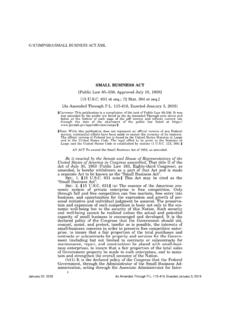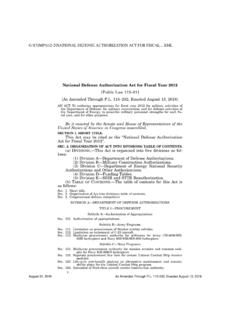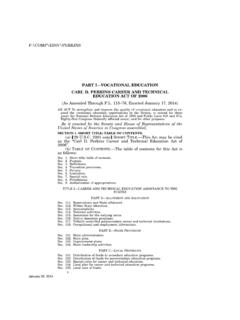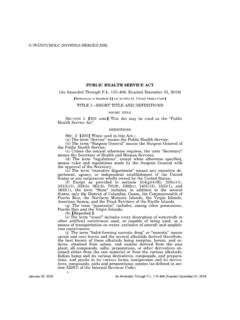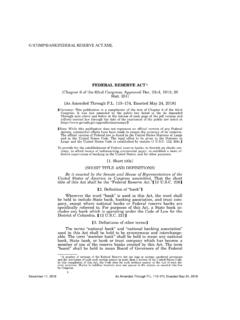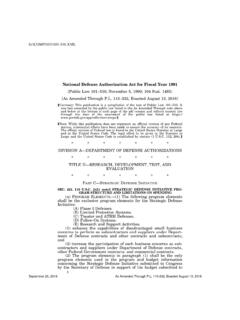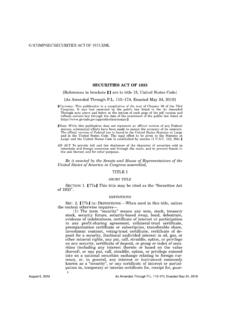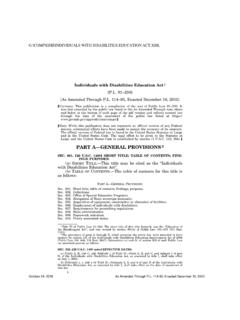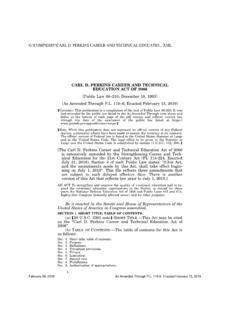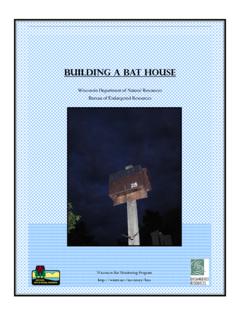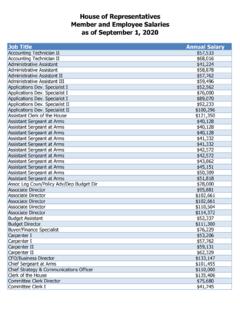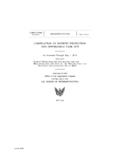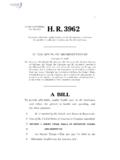Transcription of CIVIL68 - House Office of the Legislative Counsel
1 1 CIVIL RIGHTS ACT OF 1968 F:\COMP\CIVILRTS\ CIVIL68 May 2, 2013 F:\COMP\CIVILRTS\ CIVIL68 May 2, 2013 3 CIVIL RIGHTS ACT OF 1968 (Public Law 90 284, 82 Stat. 73) [As Amended Through 113 4, Enacted March 7, 2013] AN ACT To prescribe penalties for certain acts of violence or intimidation, and for other purposes. Be it enacted by the Senate and House of Representatives of the United States of America in Congress assembled, That this Act may be cited as the Civil Rights Act of 1968 . TITLE I INTERFERENCE WITH FEDERALLY PROTECTED ACTIVITIES SEC. 101. (a) Amends chapter 13, civil rights, title 18, United States Code, by inserting at the end thereof a new section 245 (re-lating to federally protected civil rights activities). (b) Nothing contained in this section shall apply to or affect ac-tivities under title VIII of this Act. (c) The provisions of this section shall not apply to acts or omissions on the part of law enforcement officers, members of the National Guard, as defined in section 101(9) of title 10, United States Code, members of the organized militia of any State or the District of Columbia, not covered by such section 101(9), or mem-bers of the Armed Forces of the United States, who are engaged in suppressing a riot or civil disturbance or restoring law and order during a riot or civil disturbance.
2 SEC. 102. Amends the analysis of chapter 13 of title 18 of the United States Code by adding at the end thereof an item for the catchline of the section 245 added by subsection (a). SEC. 103. (a) Amends section 241 of title 18 United States Code. (b) Amends section 242 of title 18, United States Code. (c) Amends section 12 of the Voting Rights Act of 1965. SEC. 104. (a) Amends title 18 of the United States Code by inserting, immediately after chapter 101 a new chapter 102 (riots). (b) Amends the table of contents to PARTI. CRIMES of title 18, United States Code. TITLE II RIGHTS OF INDIANS DEFINITIONS SEC. 201. For purposes of this title, the term (1) Indian tribe means any tribe, band, or other group of In-dians subject to the jurisdiction of the United States and recog-nized as possessing powers of self-government; F:\COMP\CIVILRTS\ CIVIL68 May 2, 2013 4 Sec.
3 202 CIVIL RIGHTS ACT OF 1968 1So in law. See amendment made by section 234(a)(1) of Public Law 111 211. (2) powers of self-government means and includes all govern-mental powers possessed by an Indian tribe, executive, Legislative , and judicial, and all offices, bodies, and tribunals by and through which they are executed, including courts of Indian offenses; and (3) Indian court means any Indian tribal court or court of In-dian offense. 25 1301 INDIAN RIGHTS SEC. (a) INGENERAL. No Indian tribe in exercising powers of self- government shall (1) make or enforce any law prohibiting the free exercise of religion, or abridging the freedom of speech, or of the press, or the right of the people peaceably to assemble and to petition for a redress of grievances; (2) violate the right of the people to be secure in their per-sons, houses, papers, and effects against unreasonable search and seizures, nor issue warrants, but upon probable cause, supported by oath or affirmation, and particularly describing the place to be searched and the person or thing to be seized; (3) subject any person for the same offense to be twice put in jeopardy; (4) compel any person in any criminal case to be a witness against himself.
4 (5) take any private property for a public use without just compensation; (6) deny to any person in a criminal proceeding the right to a speedy and public trial, to be informed of the nature and cause of the accusation, to be confronted with the witnesses against him, to have compulsory process for obtaining wit-nesses in his favor, and at his own expense to have assistance of Counsel for his defense (except as provided in subsection (b)); (7)(A) require excessive bail, impose excessive fines, or in-flict cruel and unusual punishments; (B) except as provided in subparagraph (C), impose for conviction of any 1 offense any penalty or punishment greater than imprisonment for a term of 1 year or a fine of $5,000, or both; (C) subject to subsection (b), impose for conviction of any 1 offense any penalty or punishment greater than imprison-ment for a term of 3 years or a fine of $15,000, or both; or (D) impose on a person in a criminal proceeding a total penalty or punishment greater than imprisonment for a term of 9 years; (8) deny to any person within its jurisdiction the equal pro-tection of its laws or deprive any person of liberty or property without due process of law; (9) pass any bill or attainder or ex post facto law; or F:\COMP\CIVILRTS\ CIVIL68 May 2, 2013 5 Sec.
5 202 CIVIL RIGHTS ACT OF 1968 (10) deny to any person accused of an offense punishable by imprisonment the right, upon request, to a trial by jury of not less than six persons. (b) OFFENSESSUBJECT TOGREATERTHAN1-YEARIMPRISON-MENT OR AFINEGREATERTHAN$5,000. A tribal court may sub-ject a defendant to a term of imprisonment greater than 1 year but not to exceed 3 years for any 1 offense, or a fine greater than $5,000 but not to exceed $15,000, or both, if the defendant is a per-son accused of a criminal offense who (1) has been previously convicted of the same or a com-parable offense by any jurisdiction in the United States; or (2) is being prosecuted for an offense comparable to an of-fense that would be punishable by more than 1 year of impris-onment if prosecuted by the United States or any of the States.
6 (c) RIGHTS OFDEFENDANTS. In a criminal proceeding in which an Indian tribe, in exercising powers of self-government, imposes a total term of imprisonment of more than 1 year on a defendant, the Indian tribe shall (1) provide to the defendant the right to effective assist-ance of Counsel at least equal to that guaranteed by the United States Constitution; and (2) at the expense of the tribal government, provide an in-digent defendant the assistance of a defense attorney licensed to practice law by any jurisdiction in the United States that applies appropriate professional licensing standards and effec-tively ensures the competence and professional responsibility of its licensed attorneys; (3) require that the judge presiding over the criminal pro-ceeding (A) has sufficient legal training to preside over crimi-nal proceedings.
7 And (B) is licensed to practice law by any jurisdiction in the United States; (4) prior to charging the defendant, make publicly avail-able the criminal laws (including regulations and interpreta-tive documents), rules of evidence, and rules of criminal proce-dure (including rules governing the recusal of judges in appro-priate circumstances) of the tribal government; and (5) maintain a record of the criminal proceeding, including an audio or other recording of the trial proceeding. (d) SENTENCES. In the case of a defendant sentenced in ac-cordance with subsections (b) and (c), a tribal court may require the defendant (1) to serve the sentence (A) in a tribal correctional center that has been ap-proved by the Bureau of Indian Affairs for long-term incar-ceration, in accordance with guidelines to be developed by the Bureau of Indian Affairs (in consultation with Indian tribes) not later than 180 days after the date of enactment of the Tribal Law and Order Act of 2010; (B) in the nearest appropriate Federal facility, at the expense of the United States pursuant to the Bureau of Prisons tribal prisoner pilot program described in section 304(c) of the Tribal Law and Order Act of 2010; F:\COMP\CIVILRTS\ CIVIL68 May 2, 2013 6 Sec.
8 203 CIVIL RIGHTS ACT OF 1968 (C) in a State or local government-approved detention or correctional center pursuant to an agreement between the Indian tribe and the State or local government; or (D) in an alternative rehabilitation center of an Indian tribe; or (2) to serve another alternative form of punishment, as de-termined by the tribal court judge pursuant to tribal law. (e) DEFINITION OFOFFENSE. In this section, the term offense means a violation of a criminal law. (f) EFFECT OFSECTION. Nothing in this section affects the ob-ligation of the United States, or any State government that has been delegated authority by the United States, to investigate and prosecute any criminal violation in Indian country. 25 1302 HABEAS CORPUS SEC. 203. The privilege of the writ of habeas corpus shall be available to any person, in a court of the United States, to test the legality of his detention by order of an Indian tribe.
9 25 1303 SEC. 204. 25 1304 TRIBAL JURISDICTION OVER CRIMES OF DO-MESTIC VIOLENCE. (a) DEFINITIONS. In this section: (1) DATING VIOLENCE. The term dating violence means violence committed by a person who is or has been in a social relationship of a romantic or intimate nature with the victim, as determined by the length of the relationship, the type of re-lationship, and the frequency of interaction between the per-sons involved in the relationship. (2) DOMESTIC VIOLENCE. The term domestic violence means violence committed by a current or former spouse or in-timate partner of the victim, by a person with whom the victim shares a child in common, by a person who is cohabitating with or has cohabitated with the victim as a spouse or intimate partner, or by a person similarly situated to a spouse of the victim under the domestic- or family- violence laws of an In-dian tribe that has jurisdiction over the Indian country where the violence occurs.
10 (3) INDIAN COUNTRY. The term Indian country has the meaning given the term in section 1151 of title 18, United States Code. (4) PARTICIPATING TRIBE. The term participating tribe means an Indian tribe that elects to exercise special domestic violence criminal jurisdiction over the Indian country of that Indian tribe. (5) PROTECTION ORDER. The term protection order (A) means any injunction, restraining order, or other order issued by a civil or criminal court for the purpose of preventing violent or threatening acts or harassment against, sexual violence against, contact or communication with, or physical proximity to, another person; and (B) includes any temporary or final order issued by a civil or criminal court, whether obtained by filing an inde-F:\COMP\CIVILRTS\ CIVIL68 May 2, 2013 7 Sec.
